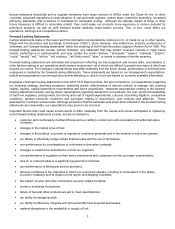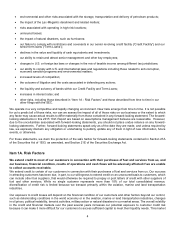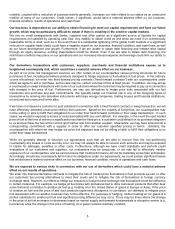World Fuel Services 2015 Annual Report Download - page 18
Download and view the complete annual report
Please find page 18 of the 2015 World Fuel Services annual report below. You can navigate through the pages in the report by either clicking on the pages listed below, or by using the keyword search tool below to find specific information within the annual report.13
If we fail to successfully manage the implementation of an upgrade to our global enterprise resource planning
(“ERP”) platform, our operations and operating results could be adversely affected.
In 2015, we committed to undertake a multi-year project designed to drive greater improvement in operating efficiencies
and optimize scalability, particularly when integrating future acquisitions. We will accomplish this in part by a global
design and deployment of an upgrade to our existing ERP platform. We are currently in the early planning phase and the
costs incurred to date have not been significant. We expect the total cost of the project over the next three years to range
between $30.0 million and $40.0 million. If we fail to successfully implement the upgrade to our existing ERP platform, or
should we experience material delays in implementation, our ability to grow our business could be adversely affected.
Estimating the expenditures related to an upgrade of an ERP platform is highly complex and subject to variables that can
significantly increase costs. Should the actual costs exceed our estimates, our liquidity and results of operations could be
adversely affected.
Our operations may be adversely affected by legislation and competition from other energy sources and new or
advanced technology.
Fuel competes with other sources of energy, some of which are less costly on an equivalent energy basis. There are
significant governmental incentives and consumer pressures to increase the use of alternative fuels in the United States
and abroad. A number of automotive, industrial and power generation manufacturers are developing more fuel efficient
engines, hybrid engines and alternative clean power systems using fuel cells or clean burning gaseous fuels. The more
successful these alternatives become as a result of governmental incentives or regulations, technological advances,
consumer demand, improved pricing or otherwise, the greater the potential negative impact on pricing and demand for our
products and services and accordingly, our profitability.
In addition, federal, state, local and/or foreign governments may enact legislation or regulations that attempt to control or
limit GHGs such as carbon dioxide. Such laws or regulations could impose costs tied to carbon emissions, operational
requirements or restrictions, or additional charges to fund energy efficiency activities. They could also provide a cost
advantage to alternative energy sources, result in other costs or requirements, such as costs associated with the adoption
of new infrastructure and technology to respond to new mandates, or impose costs or restrictions on end users of fuel. For
example, some of our customers in the transportation industry may be required to purchase allowances or offsets or incur
other costs to comply with existing or future requirements relating to GHG. Finally, the focus on climate change could also
negatively impact the reputation of fuel products or services such as those we offer. The occurrence of any of the foregoing
events could put upward pressure on the cost of fuel relative to other energy sources, increase our costs and the prices we
charge our customers, reduce the demand for our products, and therefore adversely affect our business, financial condition,
results of operations and cash flows.
Insurance coverage for some of our operations may be insufficient to cover losses, which may have a material
adverse effect on our financial condition and results of operations.
We maintain insurance to cover various risks associated with the operation of our business. Certain risks, however, such
as environmental risks, are not fully insurable and our insurance coverage does not cover all potential losses, costs, or
liabilities. Accordingly, our insurance policies may not adequately cover or may have exclusions of coverage for certain
losses. Therefore, there can be no assurance that our insurance coverage will be available or will be adequate to cover
claims that may arise.
Furthermore, our ability to obtain and maintain adequate insurance and the cost of such insurance may be affected by
significant claims and conditions in the insurance market over which we have no control. If the cost of insurance increases,
we may decide to discontinue certain insurance coverage, reduce our level of coverage or increase our
deductibles/retentions in order to offset the cost increase. In addition, our existing types and levels of insurance coverage
could become difficult or impossible to obtain in the future. The occurrence of an event that is not fully covered by insurance,
the loss of insurance coverage or a significant increase in the cost of insurance could have a material adverse effect on our
business, financial condition, results of operations and cash flows.
Current and future litigation could have a material adverse effect on our business and results of operations.
We are currently, and may in the future be, involved in legal proceedings that arise in the ordinary course of our business.
Lawsuits and other administrative or legal proceedings can involve substantial costs, including the costs associated with
investigation, litigation and possible settlement, judgment, penalty or fine. Although we generally maintain insurance to
mitigate certain costs, there can be no assurance that costs associated with lawsuits or other legal proceedings will not
exceed the limits of insurance policies. Our business, financial condition, results of operations and cash flows could be
adversely affected if a judgment, penalty or fine is not fully covered by insurance.
























